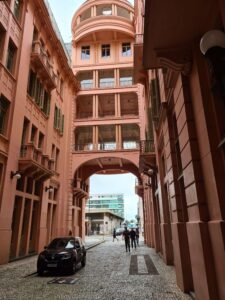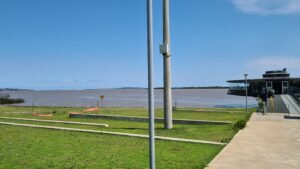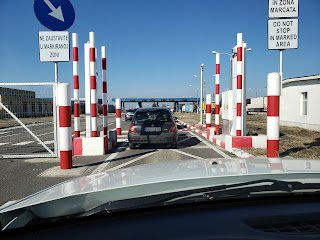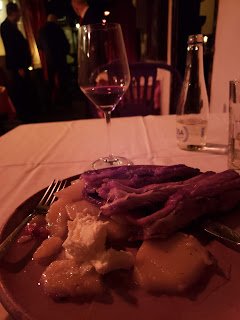Porto Alegre I
The airport reminded me of similar ones in any middle-sized European city, although it has the peculiarity, found also elsewhere in Brazil, that to retrieve your baggage you have to go through the departures hall. There is a moment’s confusion when the dazed arriving passenger is uncertain where to go, until a not very conspicuous “baggage claim” sign is spotted in a faraway corner. Campinas’s Viracopos Airport has a similarly confusing configuration.
It was Sunday. Although it was still early that October evening and the days were beginning to get longer, darkness had fallen over Porto Alegre. Edson, my taxi driver, seemed world-weary and rather apathetic, but half-way through the ride he demanded to know my nationality. I obliged, and volunteered that this was a leg in a longer journey south, adding to boot that I had wanted to stop in his city for a Mario Quintana pilgrimage. At this he straightened in his seat. “I met Mario Quintana!” he announced. It turned out he had seen Quintana talking to someone in a street café, which I thought entirely plausible. When we reached my destination, he offered to drive me further up the road to show me Quintana’s house. Less than two hundred metres on, he grandly stretched his arm towards an impressive ochre building. He took time to point out exactly what room in what floor had been the great man’s abode. I got the drift of his explanation through the thickness of what was my first encounter with a different regional accent, unhelpfully muffled by the obligatory mask. Then my driver took me back to where I was going to lodge.

Once I dropped my luggage, the next challenge was to find somewhere to eat. It was only half-past eight, but my road, Rua dos Andradas, was deserted. So were all the neighbouring ones. I found a grocer’s where I was lucky to find gluten-free biscuits for tomorrow’s breakfast. The two men at the shop took the matter of my dinner seriously and gave me assurances that a place next to where one of them lived, just around the corner, opened until ten on Sundays. Not this Sunday, as I found when I got there. Eventually I went back to my lodgings, looked something up on internet, called the place to check if it was opened and ordered an Uber. When I got there, I found it was not taking customers anymore. I protested that they could have mentioned that detail when I phoned only ten minutes earlier. They could see my point, and they let me in. La Pietra Antica had pizza on the menu, and nothing other than pizza. I had to take the glutenous risk. Writing this the following afternoon, I can report that the gluten brought no ill effects this time. Back at La Pietra Antica, as I waited for my Uber the porter who had tried to stop my entry earlier treated me to some chat. He chided me for not asking for gluten-free pizza, which he was sure the owner would have provided on request. He told me he was from Trinidad do Sul, presumably elsewhere in the state we were in, Rio Grande do Sul. He was pleasant, and his accent more accessible than others.
On Monday morning, the cobbled Andradas street was abuzz with trade. The population looks less diverse than that of São Paulo, although the Afrobrazilian presence is not absent. I was struck by the clusters of men, street traders all of them, of a gleaming, almost blue complexion which did not seem Brazilian. I strained to hear their conversation but all I could tell was that it was not in Portuguese. Is this where the African refugees concentrate, I wondered? Why not in Bahia state, known for its strong diasporic heritage? Does the relative prosperity of the south attract them? I know that there is also an influx of Haitian immigration into Brazil, but I was not picking the slightest trace of French in these tradesmen’s speech. As the street got busier, a busker was doggedly getting through an under-tempo rendition of a Haydn string quartet’s viola part.
It was a relief to be charged more reasonable prices for food than in São Paulo, but the fare on offer was even more limited here. For my dinner outing I experimented with travelling light, leaving my shoulder bag behind. Only at the time of paying did I realise I had remembered to bring my glasses and my mobile phone, but not my wallet. Thus I found myself in that perfect nightmare of a scenario: strange city, dinner eaten, no money to pay. An attempt to pay with the bank’s app did not work due to a perfectly timed demand that I should configure the app afresh. But this is Brazil, I thought. There had to be a sensible solution. The chap at the counter had to ask his manager first, but the manager came out to say it was absolutely fine, I could go and come back with my wallet in my own time. Naturally I came back without delay, settled my bill and felt dutybound to return to dine at this joint the next day.

On my second day I walked along the riverside. Its spacious silence brought fond memories of my walks along the Sava in Belgrade two years ago. In the afternoon I walked to Cidade Baixa in search of a café that had been highly recommended. I located the café, named Agridoce, but found that it was not serving customers because of the pandemic; only takeaway service. Their coffee, which I drank seated in a public bench in the pavement nearby, lived up to the good reviews. That will be a place to try again should I come back to Porto Alegre in less austere times.
The plan had been to hire a car on the third day and to head for Gramado and Canela, two places that had been praised to high heaven by various informants. I had long nurtured a curiosity for Brazil’s German towns and to see them had seemed an appropriate farewell to the country that had sheltered me for the best part of my exile this far. But on my last night in Porto Alegre I had to bow to the reality that I was in no mood for tourism. I am a lousy sightseer at the best of times. Leisurely rides is something I had only ever done to please others. To go sightseeing alone? A day in Belgrade, sandwiched between more pressing things, is one thing. To hire a car expressly to drive to places for the sake of visiting them is a different thing altogether. It would be a frivolity. I made the necessary schedule changes and on 7 October I took a flight away from Porto Alegre.


